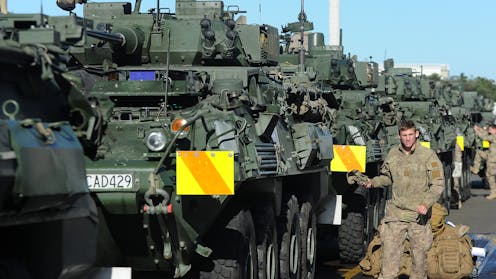Defence spending is like insurance – how will NZ pay the higher premiums?
- Written by Stephen Hickson, Lecturer in Economics and Director, Business Taught Masters Programme, University of Canterbury

Defence spending is like insurance – you have to pay for it but you hope you never have to use it. And the higher the risk you face, the higher your premium will be.
New Zealand has now committed to paying those higher defence insurance premiums. The government’s 2025 Defence Capability Plan[1], released in April, includes NZ$9 billion in extra funding over the next four years. That’s a sizable increase on a current annual budget of just under $5 billion[2].
New Zealand is not alone, of course. Driven by geopolitical tensions and US President Donald Trump’s demand that other countries spend a higher proportion of their GDP on defence, global military spending rose for the tenth year in a row to US$2,718 billion in 2024[3], with huge increases in Europe and the Middle East.
How much “insurance” a country should buy in the form of defence spending will vary. Too little, and it cannot respond when it needs to; too much, and resources are needlessly wasted. For New Zealand, it is a matter of finding the right balance.
Economically, however, defence spending is more complicated than simply buying weapons and recruiting more personnel. There can be benefits beyond basic security considerations.
One involves what economists call “technology spillovers”. Past innovations developed for military use – such as jet engines, GPS and the internet – often found important civilian applications.
The challenge is to design defence investments to deliberately build skills and technologies with wider economic benefit: advanced manufacturing, cybersecurity or clean tech. New Zealand’s defence plan includes this kind of spending, including between $100 million and 300 million on cybersecurity.
On the other hand, promises of new jobs from large projects are often overstated, with New Zealand’s best known example being the “Think Big[4]” policy of the 1970s. Rather, there can be job substitution as people move from civilian roles into military ones.
Guns and butter
In the end, of course, increased defence spending must be funded – through higher taxes, more debt or reduced spending on other items. Higher GDP growth would make the expenditure more affordable, but even then we face the same tradeoffs. It’s not possible to have lower taxes and debt as well as higher government spending.
Most of the expenditure set out in the defence plan will be on equipment. But any increase in the output of the defence industry will likely crowd out other consumer and investment goods.
While clearly an extreme example, one only has to look at how defence spending rose during WWII[5]. The increase in military output came at the expense of other goods, leading to shortages and rationing.
New Zealand doesn’t face that scale of change, but there is still likely to be some shift in production from “butter to guns”. We might also see a shift in how businesses spend their research and development money, towards military and away from civilian applications.
New Zealand does not have a large defence industry and will need to import much of the new equipment. This implies a need for higher exports to pay for those imports, meaning fewer goods for New Zealanders to consume.
Costs and benefits
Most countries are understandably reluctant to cut spending on health, education and other things voters care about in order to boost defence. Hence, governments can be tempted to label new expenditures as “defence” when it could otherwise be classified as “updated infrastructure”.
Spending on dual-purpose capital works is likely to increase, therefore, with projects earmarked for defence more likely to be funded. The New Zealand defence plan already allows for housing, airfield and port facilities that can all have multiple uses.
There are also ethical considerations. Many consumers prefer not to invest in the arms trade, but components used in weapons manufacture often have non-military uses as well.
Similarly, many consumer items, such as phones, vehicles and food, can be purchased by the military but clearly have non-military uses. We may see more of the output of companies that also produce non-military items directed into defence.
All of this can make it difficult to classify a company as a defence contractor, and may be challenging for large investors (such as superannuation funds) with ethical investment policies. At the same time, the cost of not investing in defence firms might also rise as demand for their products or services increases and they become better investments[6].
Like people in general, countries prefer lower insurance premiums. But when risks increase, so too does the price of insurance. Voters will disagree on how much should be spent on defence, but that is largely a political question.
What economics teaches us, however, is that if you want to reduce your insurance premium, then reduce your risk. And that is something easier said than done.
References
- ^ 2025 Defence Capability Plan (www.defence.govt.nz)
- ^ just under $5 billion (www.treasury.govt.nz)
- ^ US$2,718 billion in 2024 (www.sipri.org)
- ^ Think Big (www.nzinitiative.org.nz)
- ^ defence spending rose during WWII (www.statista.com)
- ^ become better investments (www.ft.com)
Authors: Stephen Hickson, Lecturer in Economics and Director, Business Taught Masters Programme, University of Canterbury







